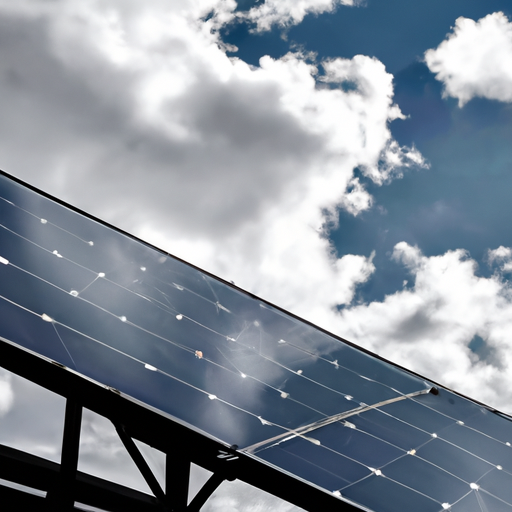Have you ever wondered if solar panels still work when it’s cloudy outside? It’s a common question, and here at HomeSolarDIY, we’re here to provide you with all the answers you need. So, if you’re curious about the efficiency of solar panels during cloudy days, keep reading!
In our upcoming article, we’ll dive into the science behind solar panels and how they generate electricity. We’ll explain how panels can still produce energy even when the sun is hiding behind clouds. You’ll learn about the factors that affect solar panel performance during cloudy days and discover some practical tips to optimize their efficiency. So, whether you’re considering installing solar panels or just want to satisfy your curiosity, we’ve got you covered. Stay tuned to HomeSolarDIY and unlock the secrets of solar power!
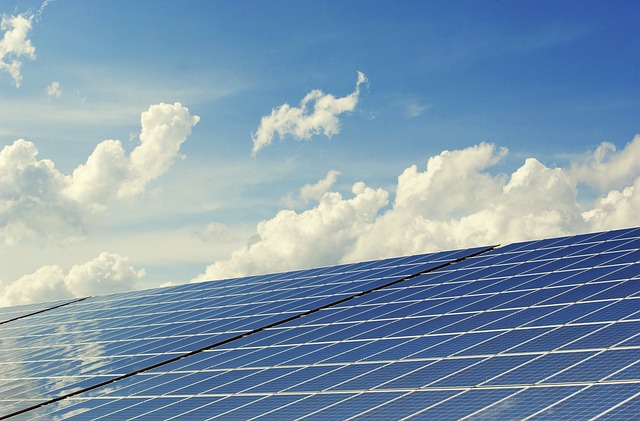
This image is property of pixabay.com.
Introduction to Solar Panels
Solar panels, also known as photovoltaic (PV) panels, are devices that convert sunlight into usable electricity. They are made up of numerous solar cells, which contain semiconductor material that absorbs photons from the sunlight. This absorbed light energy is then converted into direct current (DC) electricity.
Solar panels have gained popularity as a renewable energy source due to their ability to reduce reliance on traditional fossil fuels. They offer numerous benefits, including lower energy bills, reduced carbon footprint, and potential financial incentives.
How Solar Panels Work
Solar panels work by utilizing the photovoltaic effect, which is the process of converting light into electricity. When sunlight hits the solar cells, the photons from the sunlight excite the electrons in the semiconductor material of the cells. This creates an electric current, which can then be used or stored for later use.
The electrical current produced by the solar panels is in the form of direct current (DC). However, most homes and businesses use alternating current (AC) electricity. To convert the DC electricity produced by the solar panels into AC electricity, an inverter is necessary.
An inverter is a device that converts the DC electricity into AC electricity, which can then be used to power appliances and lighting in homes and businesses. It is connected to the solar panels and the electrical grid, ensuring a seamless flow of electricity.

This image is property of pixabay.com.
Solar Panels and Sunlight
Solar panels rely on sunlight to generate electricity. The amount of electricity produced by solar panels is directly proportional to the intensity and duration of sunlight exposure. This means that on sunny days with clear skies and direct sunlight, solar panels produce the maximum amount of electricity.
However, it is important to note that solar panels do not require direct sunlight to function. Even on cloudy days, solar panels can still generate electricity. While the amount of electricity produced may be lower compared to sunny days, solar panels can still make a valuable contribution to your energy needs.
Effect of Cloudy Days on Solar Panels
On cloudy days, the intensity of sunlight reaching the solar panels is reduced. This is because clouds block and scatter sunlight, resulting in less direct sunlight reaching the solar cells. As a result, the electricity production of solar panels is lower compared to sunny days.
The decrease in electricity production on cloudy days varies depending on the thickness and type of clouds. Thick and dark clouds have a greater impact on reducing the amount of sunlight that reaches the solar panels, resulting in lower electricity production.
Additionally, the angle and tilt of the solar panels also play a role in determining their performance on cloudy days. If the solar panels are optimally angled and tilted, they can still capture a significant amount of diffused sunlight, even on cloudy days.
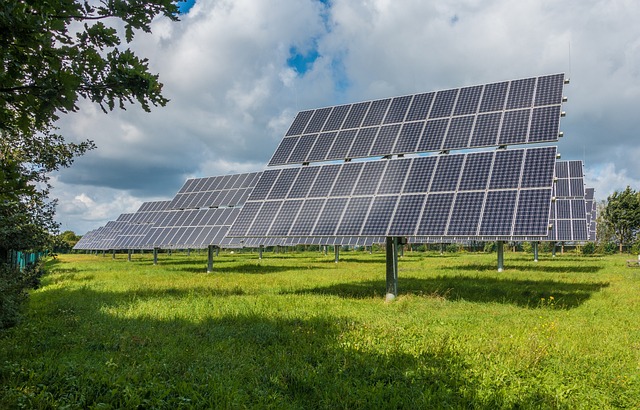
This image is property of pixabay.com.
Understanding the Impact of Clouds on Solar Panels
It is essential to understand that cloud cover does not completely prevent solar panels from producing electricity. Clouds can diffuse sunlight, scattering it in multiple directions. This diffused sunlight can still reach the solar panels and generate electricity, albeit at a lower intensity.
Furthermore, solar panels are designed to capture a broad spectrum of light, including ultraviolet (UV) and infrared (IR) radiation. Even on cloudy days, these types of light can still penetrate through the cloud cover and contribute to the electricity generation of solar panels.
While the overall electricity production of solar panels may be reduced on cloudy days, they still provide a reliable source of clean energy. The power output may vary, but solar panels continue to make a positive impact on reducing carbon emissions and saving energy costs.
Factors Affecting Solar Panel Performance on Cloudy Days
Several factors impact the performance of solar panels on cloudy days. These factors include:
-
Cloud thickness and type: Thick and dark clouds reduce the intensity of sunlight reaching the solar panels, resulting in lower electricity production. Lighter clouds have a lesser impact on solar panel performance.
-
Panel orientation: The angle and tilt of the solar panels affect their ability to capture diffused sunlight. Optimal panel orientation can maximize the electricity production on cloudy days.
-
Temperature: Solar panels generally work more efficiently in cooler temperatures. Cloudy days often come with lower temperatures, which can enhance the performance of solar panels.
-
Panel cleanliness: Dust, dirt, and debris on the surface of solar panels can reduce their efficiency. Regular cleaning and maintenance ensure optimal solar panel performance, even on cloudy days.
-
Panel age and quality: Older solar panels or panels of lower quality may experience a greater decrease in performance on cloudy days. Investing in high-quality panels can mitigate this issue.
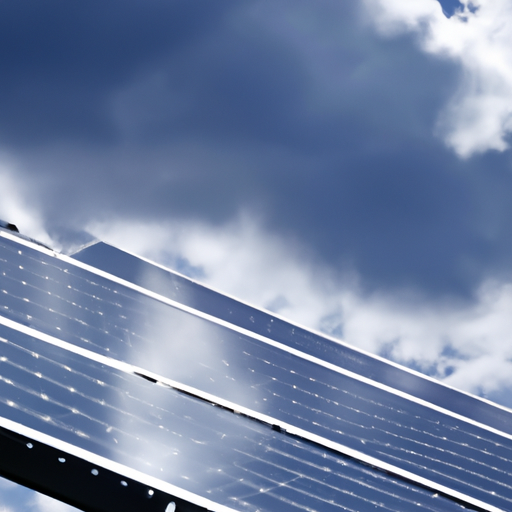
The Role of Technology in Enhancing Solar Panel Efficiency
Advancements in solar panel technology have significantly improved their efficiency, even on cloudy days. Some key technological advancements include:
-
Bifacial solar panels: These panels capture light from both sides, allowing them to generate electricity from direct sunlight as well as diffused light reflected from the ground or nearby surfaces.
-
Thin-film solar panels: These panels are more flexible and lightweight compared to traditional solar panels. They have a higher tolerance for lower light conditions, making them suitable for areas with cloudy climates.
-
Maximum Power Point Tracking (MPPT) technology: MPPT technology enables solar panels to optimize their energy production by adjusting the electrical load to match the varying sunlight conditions.
-
Energy storage solutions: Battery storage systems allow excess electricity generated by solar panels to be stored for later use, ensuring a constant power supply even during cloudy days or at night.
These technological advancements contribute to the overall efficiency and performance of solar panels, making them a viable option even in areas with cloudy weather patterns.
Tips for Maximizing Solar Panel Performance during Cloudy Days
While solar panels can still generate electricity on cloudy days, there are measures you can take to maximize their performance. Here are some tips:
-
Optimal panel positioning: Ensure your solar panels are angled and tilted properly to capture the maximum amount of diffused sunlight. Consult with a professional if necessary.
-
Regular panel maintenance: Keep your solar panels clean and free from dirt, debris, and snow, as these can obstruct sunlight and reduce their efficiency.
-
Efficient energy usage: Make energy-efficient choices by using energy-saving appliances, LED lighting, and properly insulating your home. This will reduce your overall energy consumption and maximize the impact of your solar panels.
-
Battery storage system: Consider investing in battery storage systems to store excess electricity generated by your solar panels. This way, you can utilize the stored energy during cloudy days or at night.
-
Monitor your solar panel performance: Keep track of the energy production of your solar panels to identify any issues or changes in performance. This will help you ensure optimal efficiency and address any maintenance requirements promptly.
By implementing these tips, you can make the most of your solar panels, even when the weather is cloudy.
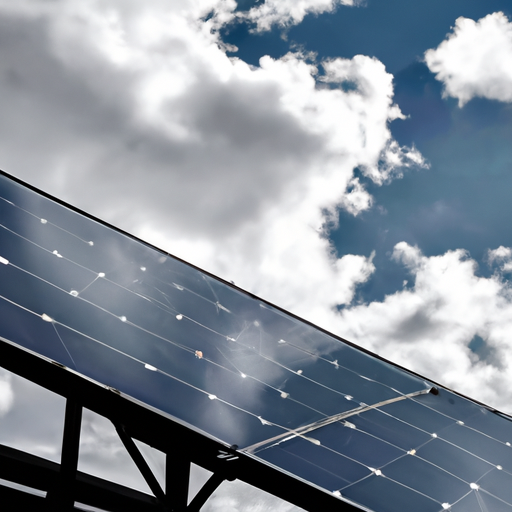
Benefits of Solar Panels in Cloudy Climates
Despite the lower electricity production on cloudy days, solar panels can still offer numerous benefits in cloudy climates:
-
Lower energy bills: Even with reduced output, solar panels can significantly reduce your reliance on grid-supplied electricity, leading to lower energy bills.
-
Environmental impact: Solar panels produce clean and renewable energy, reducing your carbon footprint. By relying on solar power, you help combat climate change and promote sustainability.
-
Grid independence: Solar panels provide you with a degree of energy independence. Even during extended periods of cloud cover, you can still rely on the energy generated by your solar panels, reducing your dependence on the electrical grid.
-
Financial incentives: Many governments and energy companies offer incentives, such as tax credits and feed-in tariffs, to encourage solar panel installation. These incentives can help offset the initial investment costs and make solar panels more accessible.
-
Long-term savings: Solar panels have a long lifespan and require minimal maintenance. Over time, the savings on energy bills can outweigh the initial investment, providing long-term financial benefits.
Conclusion
Despite the common notion that solar panels only work efficiently under direct sunlight, they can still generate electricity on cloudy days. While the power output may be lower, solar panels continue to make a valuable contribution to your energy needs and have a positive impact on the environment.
Advancements in solar panel technology and the implementation of efficient practices can maximize the performance of solar panels, even when the weather is cloudy. By considering the tips mentioned above and understanding the factors that affect solar panel performance, you can make the most of your solar energy system.
Embracing solar power is not just a smart financial decision; it is a commitment to reducing your carbon footprint and embracing a sustainable future. So, don’t hesitate to explore the potential of solar panels, even in cloudy climates. With the right information, support, and technology, you can make solar energy a reliable and rewarding solution for your energy needs. Start your solar journey today with HomeSolarDIY and be a part of the green energy revolution!

